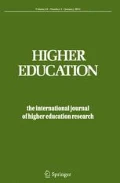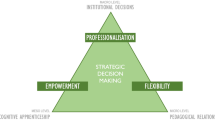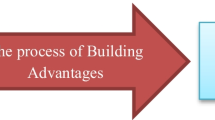Abstract
This article is written to inspire curriculum developers to centre their efforts on the learning processes of students. It presents a learning-based paradigm for higher education and demonstrates the close relationship between curriculum development and students’ learning processes. The article has three sections: Section “The role of higher education (HE) institutions” presents a discussion of the role of higher education in the knowledge society. Section “Contextual learning” presents the paradigm of contextual learning which we see as a useful foundation for curriculum development. Section “Curriculum development in practice—the BETA course” shows how a particular course in Business Economic Theory and Analysis has been developed using this paradigm. The article will be of interest to all academics interested in students’ learning processes but is especially relevant to those responsible for curriculum development.



Similar content being viewed by others
References
Assiter, A. (Ed.) (1995). Transferable skills in higher education. London: Kogan Page.
Bandura, A. (1975). Social learning & personality development. NJ: Holt, Rinehart & Winston, Inc.
Bauman, Z. (2001). Liquid modernity. Cambridge: Polity Press.
Bauman, Z. (2003). Liquid love. Cambridge: Polity Press.
Best, M. H. (1990). The new competition. Institutions of Industrial Restructuring. Cambridge: Polity Press.
Bramming, P. (2001). Kompetence-i-praksis, PhD Serie 8.2001 (Copenhagen Business School/Forlaget Samfundslitteratur, Frederiksberg).
Bruner, J. (1996). The culture of education. Cambridge: Harvard University Press.
Buch, A. (2000). Social læringsteori. Frederiksberg: Roskilde Universitetsforlag.
Glaserfeld E. (1989). Constructivism in education. In T. Husen , & T. Neville Postlethwaite (Eds.), The international encyclopedia of education. Research and studies, Supplementary Volume 1. Oxford: Pergamon Press.
Granovetter, M. (1992). The sociology of economic life. Boulder: Westview Press.
Greenwood, J. D. (1994). A sense of identity: Prolegomena to a social theory of personal identity. Journal for the Theory of Social Behavior, 24(1):25–46.
Harvey, L., & Knight, P. T. (1996). Transforming higher education. Buckingham: Society for Research into Higher Education/Open University Press.
Hermansen, M. (2005). Relearning. Copenhagen: Copenhagen Business School Press/DPU Press.
Kolb, D. A. (1984). Experiential leaning. Prentice Hall: Englewood Cliffs.
Lash, S., & Urry, J. (1987). The end of organised capitalism. Cambridge: Polity Press.
Lave J., & Wenger, E. (1991). Situated learning: Legitimate peripheral participation. Cambridge: Cambridge University Press.
Lawson, T. (1997). Economics & reality. London: Routledge.
McDermott, R. P. (1999). On becoming labelled—The story of Adam. In P. Murphy (Ed.), Learners, learning & assessment (pp. 1–21). London: Paul Champan Publishing Ltd.
Nelson, R. R., & Winter, S. G. (1982). An evolutionary theory of economic change. Cambridge and London: The Belknap Press.
Nonaka, I., & Takeuchi, H. (1995). The knowledge-creating company. Oxford: Oxford University Press.
Nygaard, C., & Andersen, I. (2005). Contextual learning in higher education. In: R. G. Milter, V. S. Perotti, & M. S. R. Segers (Eds.), Educational innovations in economics and business IX. Breaking boundaries for global learning (pp. 277–294). Springer.
Polanyi, M. (1962). Personal knowledge: Towards a post-critical philosophy. New York: Harper Torchbooks.
Polanyi, M. (1967). The tacit dimension. Garden City, New York: Doubleday Anchor.
Selznick, P. (1992). The moral commonwealth. Social theory and the promise of community. California: The University of California Press.
Vygotsky, L. S. (1987). The collected works of L. S. Vygotsky, Volume 1: Problems of general psychology. London: Plenum Press.
Wenger, E. (1998). Communities of practice. Learning, meaning and identity. Cambridge: Cambridge University Press.
Author information
Authors and Affiliations
Corresponding author
Rights and permissions
About this article
Cite this article
Nygaard, C., Højlt, T. & Hermansen, M. Learning-based curriculum development. High Educ 55, 33–50 (2008). https://doi.org/10.1007/s10734-006-9036-2
Received:
Accepted:
Published:
Issue Date:
DOI: https://doi.org/10.1007/s10734-006-9036-2




